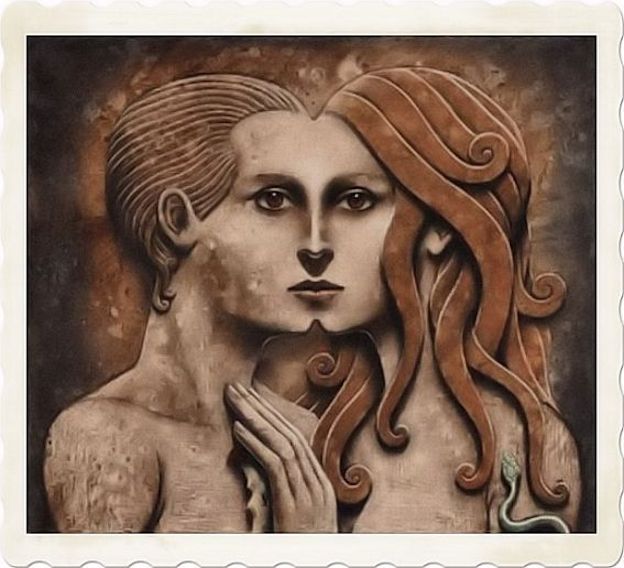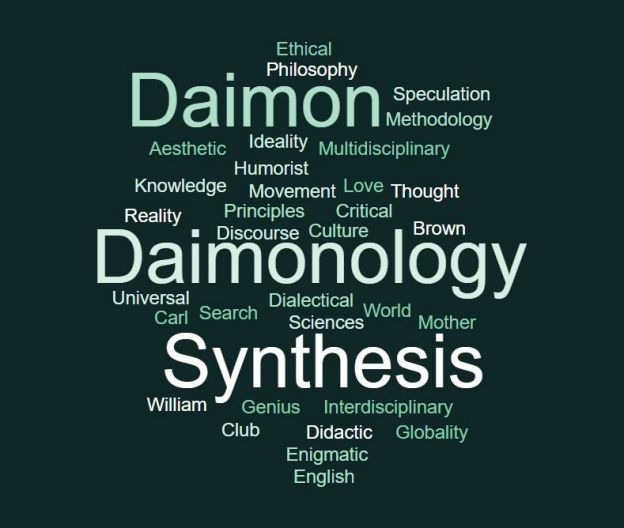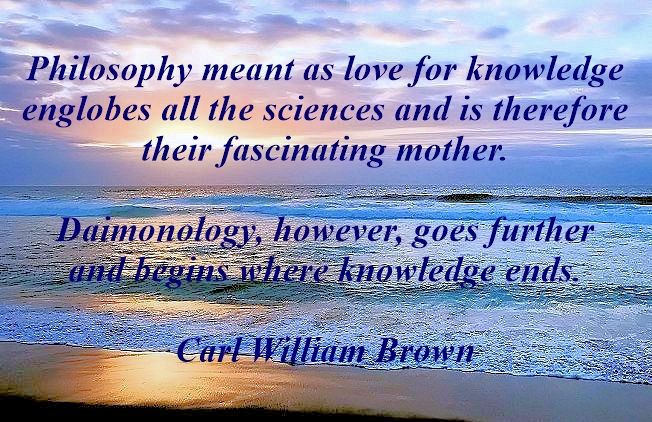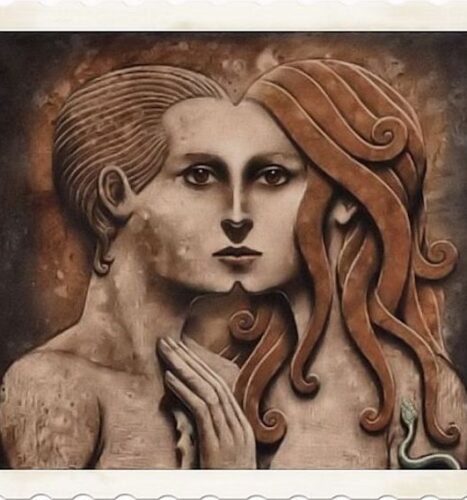
Principles of Daimonology, or better Synthetic principles of applied Daimonology, consisting of 100 aphorisms, maxims, ideas and thoughts sometimes enigmatic and a little humorous, on the dissemination and deepening of knowledge and creative thinking in general.
Before proceeding with the reading of this text, it is strongly recommended to read the introduction to Daimonology, and to better understand the subject also the posts relating to the Daimon, Plato, Socrates, and so on, whose links are given at the end of this page.
Daimonology in its literary form consists of 100 definitions or aphorisms, 60 of which were published by Carl William Brown under the title of Synthetic and Enigmatic Principles of Applied Daimonology on the Daimon Club website on 13-12-1998. The other 40 aphorisms that complete the text are now published on the Aphorismicelebri site, also by the author in question. Finally, in this article they have been translated into English.
These principles are inspired primarily by the philosophy of Socrates, Plato, Aristotle, the capital maxims of Epicurus, the aphorisms of Heraclitus, primordial philosophical wisdom with a focus on Eastern philosophy, as well as the work of Shakespeasre and Freud, and more personally by my own literary and philosophical production, as well as my own complex life experience. In this regard, I would like to remind you that I have always been engaged in teaching, cultural popularization and artistic provocation, and have also authored well over 10000 original aphorisms, various essays and articles, as well as various collections of maxims and aphorisms.
These principles are thus a kind of vademecum of creative thinking and enhancement of mental faculties. These principles of applied Daimonology thus cover, along with the Testament of C.W. Brown, the Bequest of the Daimon Club, the various written texts, and my own aphoristic production a kind of spiritual legacy that I intend to leave to weary humanity. Certainly, one cannot claim to be able to exhaust such a broad subject in a few pages and therefore perhaps not everything will be clear at first, in any case this publication is to be considered solely of an informative and popularizing nature and therefore cannot be considered an exhaustive and definitive discourse on the subject. However, I hope that it will be equally enlightening to those who will take the action of reading it and at the same time try to get into the spirit of its elaboration and interpretation. Once again therefore, thank you in advance!
Daimon is an inner force, an inner passion, a mixture of desires and aspirations. Our daimon is the genius that lives with us, good and evil at the same time. As Blake would say, it’s the marriage between heaven and hell. It’s death in life and life in death. It’s a kind of enthusiasm that guides us towards the search for knowledge, without believing in any superior entity. It’s an olistic approach to life that struggles against any form of vanity, of stupid power and false authority. It’s a form of magic, of ecstatic feeling, it’s the art of living for freedom without having to submit our inner thoughts to the banalities of our society. It’s a dream that gives hope to our intellect, it’s a mistery without solution. it’s the absurdity of our life, it’s a nonsensical joke. That’s why I thought to link the surrealistic poetics with the spirit of my creation, and that’s why the Daimon Club was born. Now I only hope to be able to communicate to other people this idea, and to divulge our love for equality, peace and freedom.
Carl William Brown
Very often there is nothing more unconscious than our ignorance, of which we obviously disregard the existence; therefore opening the mind to the ethics of knowledge and cultivating one’s learning is the only wise thing to do in order to give a sense to our mysterious life.
Carl William Brown
Perhaps he could have chosen in the best way, but his Daimon wasn’t all that reliable, moreover Dada doubted everything, and for this reason he almost never knew how to make the most appropriate choice, however he enjoyed trying, not without a certain nostalgia and melancholy suffering.
Carl William Brown

1) Daimonology gave rise to Philosophy and Philosophy to all other sciences. Starting from the origins of the principle we will reach the end of the search.
2) Philosophy meant as love for knowledge englobes all the sciences and is therefore their fascinating mother. Daimonology, however, goes further and begins where knowledge ends.
3) Daimonology is an interdisciplinary and multidisciplinary speculation that owes its birth to the genius and its dissemination to the new surrealist, nihilistic and humorist movement and naturally to the creative craftsmen and philosophers of the Daimon Club.
4) Daimonology is the discourse on genius, it is genius that questions itself and globality, it is a synthesis of the universal nothingness. It is the coincidentia oppositorum of pain and joy. It is the end of every principle.
5) Daimonology is the reality of ideality that pursues the ideality of reality. It is an ethical, aesthetic, critical, dialectical and enigmatic synthesis of global and universal thought.
6) Daimonology is reconcreted on the threshold of the third millennium and marks the way for the advent of the Daimon Age, an era in which, as usual, the global harmony of universal existence will continue to be vainly pursued.
7) Daimonology was born primarily to try to investigate and above all alleviate the most paradoxical aspects of the absurd and dogmatic existential contradictions.
8) Daimonology makes no difference between the real and the ideal, between life and death, in fact its practitioners do not need, like mediums, to evoke the spirits of the past or the future, because they themselves are spirits in constant contact with the essence of the universe.
9) Daimonology is a form of investigation, criticism, study and dissemination that makes use of all known and unknown knowledge and aims to expand the creativity and critical, synthetic and imaginative capacity of individuals.
10) Daimonology tends above all to disseminate, share and communicate knowledge in such a way that it is possible to pursue criticism and the improvement of awareness, responsibility, and fulfillment of individuals.
11) Daimonology intends to pursue the sharing, communication and diffusion of human, cosmic and universal genius. And it is precisely because it arises from the pain of not knowing that it is in turn able to overcome the limit of one’s knowledge.
12) Daimonology is aware that known things are far inferior to unknown ones and therefore believes that man’s goal can only be that of continuous research and continuous struggle. Daimonology therefore humbly pursues learned ignorance, the knowledge of self, others, power, and the universe.
13) Daimonology believes that the widespread dissemination of knowledge, criticism and imaginative, artistic, creative, empirical, cultural and scientific methodology is fundamental. In fact, Daimonology perfectly integrates literary and philosophical subjects with scientific and technological knowledge.
14) Daimonology proposes to do its utmost to improve human relationships, favoring meetings, intellectual, social, political, economic, sentimental, religious relationships, through collaborations of all kinds aimed at promoting the diffusion of the ideas and works of those who cultivate and more widely than all mankind.
15) Daimonology can also be considered as a sort of “vitalistic therapy”, a form of intellectual bioenergy which aims to improve, through study, research and contacts of all kinds, the existential condition, i.e. psychic, physical , social, economic and spiritual, of all the people who will approve the principles of its methodologies and more widely of all human beings who will read and interpret its guidelines in a positive way.

16) Daimonology has no prejudices and is perfectly aware of not possessing the revealed truth, as indeed the others certainly do not possess it either. In any case, the exact methodology for correctly applying this discipline is still reserved for the moment, therefore only the thinkers who created, organized and elaborated it can know something more to move better in its meanders.
17) Daimonology is aware that the forces of the universe are both powerful and amazing and it is therefore impossible to dominate them completely, they can only be investigated patiently, integrally and at the most they can be humbly and tenaciously opposed.
18) Daimonology needs to be in the world and out of the world, therefore it is based on observation, demolition, creation, dissemination and sharing. It is therefore a part and an extension of ethics and is to all intents and purposes a theoretical, practical, experimental and applied discipline. In any case, it wants to affect and influence the behavior of thought and action.
19) However, Daimonology is not an exact science, but rather a didactic, a methodology, a pedagogy, an applied philosophy based on common sense, logic, research and the maximum expansion and sharing of knowledge.
20) True and perfect Daimonology would be a science if it existed, in any case it is not a utopia, much less a form of asceticism or religion. It is rather a concrete and applicable technique of thought, language and dialectical reasoning, it is therefore a knowable and desirable methodology.
21) Daimonology has as its fundamental objective the global improvement of thought and behavior of the human species, proposing to employ any means for the pursuit of this end.
22) Daimonology is aware that the big is small and the small is big. It knows that Philosophy must help us to live by giving us the strength not to fear death. However, Daimonology goes further, beyond life and beyond death.
23) Daimonology is aware that for man there is no other way than the perennial search for his own pedagogy.
24) Daimonology is the arrival point from where surrealism, humor and nihilism cannot start, it is not a religion, but it is rather the guide of the genius that does not exist.
25) Anyone who wants to practice Daimonology must not be extraneous to any discipline, nor should they believe that relativity is an absolute thing. Ultimately, it is the absolute that is relative.
26) Daimonology is constituted by the plurality of genius and has inspired man since the Stone Age and will continue to inspire him until the age of no return. After the end of time and space.
27) Daimonology is the sum of complexity, in practice it is the sum of simple behaviors. True and perfect Daimonology, however, is an occult science, as nobody knows it. And those who know it cannot pass it on.
28) Daimonology does not have an order, but knows how to navigate perfectly in the Kaos of existence.
29) Scholars of Daimonology are not so much concerned with what others say, but rather with what they are able to say about others.
30) Don’t underestimate Daimonology because Daimonology will never underestimate you! And do not mock her, because she will have a good time mocking you.

31) Daimonology is a synthesis of contents, it is a methodological guide to the various disciplines and to the various methods of study and organization of reality. It is therefore a pedagogy, a didactic and an applied philosophy which, however, takes the creative art into the utmost consideration.
32) Daimonology is a guide to the interpretation of the disciplines and their methods of studying reality. It is a form of knowledge that illuminates our conscious investigations and can influence our conditioned, reflex, unconscious, unaware and relapsing behaviors.
33) Daimonology has no hierarchy, only the fascination of universal anarchy.
34) Daimonology pursues true art, the one that cannot be seen, the one that has no time, the one that cannot be created or destroyed and is not even eternal.
35) Daimonology humbly, sceptically, cynically, critically, dialectically investigates the stupidity of reality and at the same time tries to oppose the authority of power and vanity.
36) Daimonology, unlike psychology, maintains that the fault is not our responsibility, but is instead inherent in the absurd globality. The human being must therefore become aware of this funny reality, only in this way will he be able to get closer and closer to ideality.
37) Daimonology is a guide to the development of the innate genius of any individual, for this reason it aims to act as the way to follow in order to reach particular and general objectives in the most intellectually elevated way.
38) Daimonology maintains that geniuses are born and made, it is enough to be convinced of it and commit oneself to achieve one’s aspiration. Especially since there are different gradations of genius. For this reason, Daimonology aims to act as a global guide for the achievement of any pre-established objectives.
39) Daimonology is a discipline of method and content that draws upon various fields of human knowledge in order to try to provide a safe and reliable approach to navigating one’s transient existence.
40) Daimonology has a fundamentally and profoundly eclectic nature, for this reason it can only be based on the deepening of all knowledge and therefore also intends to be a point of reference for their diffusion.
41) Daimonology is a kind of maieutics and clearly preaches a learned ignorance, therefore a permanent education. Furthermore, given that human knowledge continues to increase, it intends to make synthesis one of its main working methods. Synthesis is also one of its goals while its specialization is to guide the various specializations.
42) Daimonology does not have any sacred text, but instead believes that the plurality of texts is sacred, for this reason it cannot in the least conceive logics of censorship or calculation of the economic interest in the diffusion of culture. These are abuses of power and must be contrasted.
43) Daimonology intends to favor the development of the logic of knowledge and offers its contribution as a method and strategy for the best organization of the process.
44) Daimonology pursuing the maximum dissemination and sharing of knowledge cannot conceive the arrogance of the power elites, therefore it foresees, advises and disseminates a permanent education precisely to ensure that people can take advantage of the appropriate means to protest and claim one’s own right to a better life.
45) Daimonology is not like many others a money-making discipline, but its fundamental intent is to spread knowledge. However, since the means are also needed to increase knowledge, Daimonology is concerned with developing those too.
46) Daimonology has no idol, much less any divinity, on the contrary it sets out precisely to break down the false settings of the mind. However, it certainly cannot ignore the great models that have inspired and guided the human species, not always in the most advantageous way.
47) Daimonology uses advanced techniques of reading, study, analysis, criticism, synthesis and memorization for its practices and studies. Therefore we can also say that Daimonology is a form of theoretical and applied linguistic science that takes into maximum account the neurolinguistic and biological sciences and the teaching of language. We could also say that Daimonology is a kind of method for Neuro Linguistic Programming.
48) Daimonology tends to establish in its practitioners a deep passion and a sincere enthusiasm for all those activities that allow individuals to improve their knowledge and skills.
49) Daimonology has among its main purposes the well-being of the body, of the mind, of one’s own ego, and of the ego of one’s fellows. Thus, the nature of Daimonology is profoundly eclectic, democratic, and collaborative.
50) Daimonology takes the utmost account of the relationship between the mind and the body and the consequent search for physical well-being necessarily linked to the psychic and spiritual one; in fact, he knows perfectly well that in the traditional setting of psychoanalytic consultations, physical contacts are forbidden, while in the centers of transactional and bio-energetic analysis, hugs are fundamental moments.
Here you can read the other 50 synthetic principles of Daimonology.
For those wishing to learn more about the topic, I suggest the following articles, for the moment mostly in Italian, but soon they will be also translated into English.
Principi sintetici di Daimonologia

